February 11, 2021
The future workplace will only thrive with social and customer experience at its heart
 One important concept the pandemic has taught us is that irrespective of where we work and whatever form the future workplace takes, our brand must remain strong. With much of our workforce now working from home, how do we bridge the gap between corporate and home life? As head offices re-form into social hangout hubs, and dining tables become makeshift desks, one message is loud and clear – connection with and delight in a brand is everything. From our internal talent and culture, and supply partnerships, to external customer persona, we must strengthen our culture both inside and out. (more…)
One important concept the pandemic has taught us is that irrespective of where we work and whatever form the future workplace takes, our brand must remain strong. With much of our workforce now working from home, how do we bridge the gap between corporate and home life? As head offices re-form into social hangout hubs, and dining tables become makeshift desks, one message is loud and clear – connection with and delight in a brand is everything. From our internal talent and culture, and supply partnerships, to external customer persona, we must strengthen our culture both inside and out. (more…)







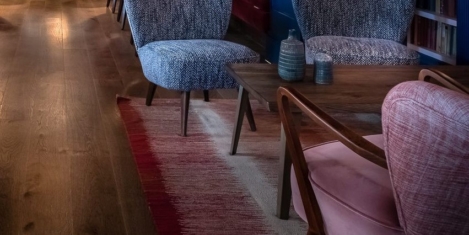
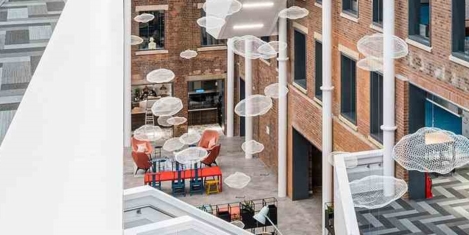
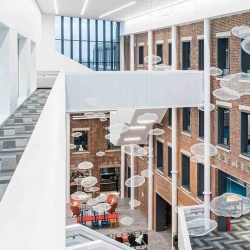 We’ve been talking to our clients a lot over the last eighteen months, informing and educating them about when upcoming green legislation might come into force and what that will mean for the construction industry. So, it’s with interest that we saw the UK government unveil its
We’ve been talking to our clients a lot over the last eighteen months, informing and educating them about when upcoming green legislation might come into force and what that will mean for the construction industry. So, it’s with interest that we saw the UK government unveil its 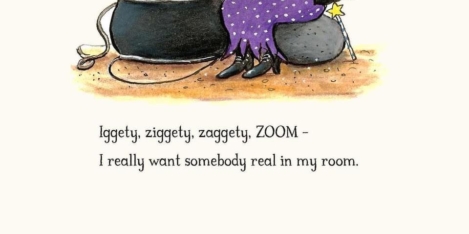
 For now, just forget the
For now, just forget the 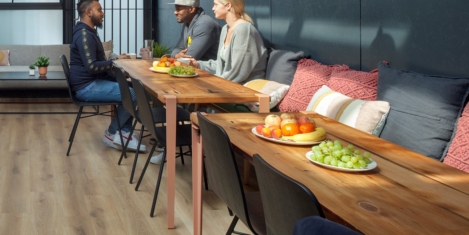
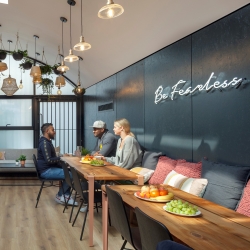 Let’s be honest, work life pre 2020 had its flaws, whilst the longing for variety of scenery, change of pace and even a train journey (somewhere…ANYWHERE) would be welcomed by many of us right now, many of us had become a bit ‘hamster wheel’ in our approach. Commuting was stressful, expensive and time hungry; our natural and individual rhythms squeezed into a set 9-5 schedule and workplace design had become a bit ‘quantity over quality’ – desks have been reducing in size year upon year in order that capacity could be increased. We had reached a point at which everything was ripe for change but there was largely a resistance to both flexible working requests and embracing much of the technological advancements that were already at our fingertips.
Let’s be honest, work life pre 2020 had its flaws, whilst the longing for variety of scenery, change of pace and even a train journey (somewhere…ANYWHERE) would be welcomed by many of us right now, many of us had become a bit ‘hamster wheel’ in our approach. Commuting was stressful, expensive and time hungry; our natural and individual rhythms squeezed into a set 9-5 schedule and workplace design had become a bit ‘quantity over quality’ – desks have been reducing in size year upon year in order that capacity could be increased. We had reached a point at which everything was ripe for change but there was largely a resistance to both flexible working requests and embracing much of the technological advancements that were already at our fingertips. 
 The Covid-19 pandemic has had an unprecedented effect on the way in which we work and has brought in to focus the challenges around mental health and wellbeing. The recognition that we are in the midst of the biggest mental health crisis since the Second World War brings the challenge in to stark focus. Time to Talk Day (today) aims to get the nation talking more openly about mental health, and there could not be a better time for it. Research from
The Covid-19 pandemic has had an unprecedented effect on the way in which we work and has brought in to focus the challenges around mental health and wellbeing. The recognition that we are in the midst of the biggest mental health crisis since the Second World War brings the challenge in to stark focus. Time to Talk Day (today) aims to get the nation talking more openly about mental health, and there could not be a better time for it. Research from 


 When the COVID-19 crisis hit the UK in March 2020, many commented that the virus didn’t discriminate and that its impact would be felt equally by everyone. However, as highlighted in Nuffield Health’s
When the COVID-19 crisis hit the UK in March 2020, many commented that the virus didn’t discriminate and that its impact would be felt equally by everyone. However, as highlighted in Nuffield Health’s 
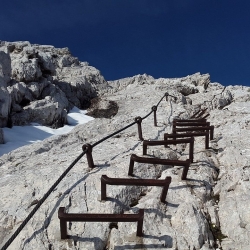 Lockdown meant that the choice to work from home was made for us. However, for many the decision to continue to do so post-lockdown will be a personal choice. The question we should all ask ourselves is, whether when we are outside of any lockdown restrictions, is working from home really a workplace revolution or simply an act of selfishness? For thousands of workers who’ve spent years of their lives commuting to offices that feel more like soul-less factories than inspiring and engaging workplaces, it’s no wonder that enforced work from home has proven popular.
Lockdown meant that the choice to work from home was made for us. However, for many the decision to continue to do so post-lockdown will be a personal choice. The question we should all ask ourselves is, whether when we are outside of any lockdown restrictions, is working from home really a workplace revolution or simply an act of selfishness? For thousands of workers who’ve spent years of their lives commuting to offices that feel more like soul-less factories than inspiring and engaging workplaces, it’s no wonder that enforced work from home has proven popular. 
 There’s no question that many people now, feeling the weight of lockdown 3 and with no clear view on the timing of any sort of ‘return to normal’, are finding it tough to stay motivated. Many are burnt out. We can gain some insight into what is going on for many individuals by way of neuroscience, specifically how the brain works and how it copes with changing situations.
There’s no question that many people now, feeling the weight of lockdown 3 and with no clear view on the timing of any sort of ‘return to normal’, are finding it tough to stay motivated. Many are burnt out. We can gain some insight into what is going on for many individuals by way of neuroscience, specifically how the brain works and how it copes with changing situations. 
 The uncertainty and fallout of the COVID-19 pandemic have wreaked havoc on the mental health of nearly all of us. In a recent conversation with an HR leader, she shared with me that every single person on her leadership programme reported suffering disrupted sleep due to their anxiety around business uncertainty. The irony is the business is in better shape than it has been for years thanks to the effective management of the firm’s finances during the pandemic. Regardless of reality, the uncertainty is impacting on everyone’s resilience levels.
The uncertainty and fallout of the COVID-19 pandemic have wreaked havoc on the mental health of nearly all of us. In a recent conversation with an HR leader, she shared with me that every single person on her leadership programme reported suffering disrupted sleep due to their anxiety around business uncertainty. The irony is the business is in better shape than it has been for years thanks to the effective management of the firm’s finances during the pandemic. Regardless of reality, the uncertainty is impacting on everyone’s resilience levels. 
 Philanthrocapitalism is a term that’s only 15 years old. A modern concept for the modern age. Or is it? In the late 1800s, George Cadbury bought a plot of land five miles south of Birmingham to relocate his factory and expand his chocolate empire. But greater levels of chocolate production weren’t his only concern; he also built an entire village to accommodate the new factory’s workforce. The plan was for this village – called Bournville, which now shares its name with the brand’s famous dark chocolate – to “alleviate the evils of modern, more cramped living conditions”. Port Sunlight, built on the Wirral Peninsula by the Lever Brothers, whose manufacturing company is now part of Unilever, offers up a similar story.
Philanthrocapitalism is a term that’s only 15 years old. A modern concept for the modern age. Or is it? In the late 1800s, George Cadbury bought a plot of land five miles south of Birmingham to relocate his factory and expand his chocolate empire. But greater levels of chocolate production weren’t his only concern; he also built an entire village to accommodate the new factory’s workforce. The plan was for this village – called Bournville, which now shares its name with the brand’s famous dark chocolate – to “alleviate the evils of modern, more cramped living conditions”. Port Sunlight, built on the Wirral Peninsula by the Lever Brothers, whose manufacturing company is now part of Unilever, offers up a similar story. 








February 16, 2021
We must seize the chance to go full circle on sustainable office design
by Joanna Knight • Comment, Environment, JK